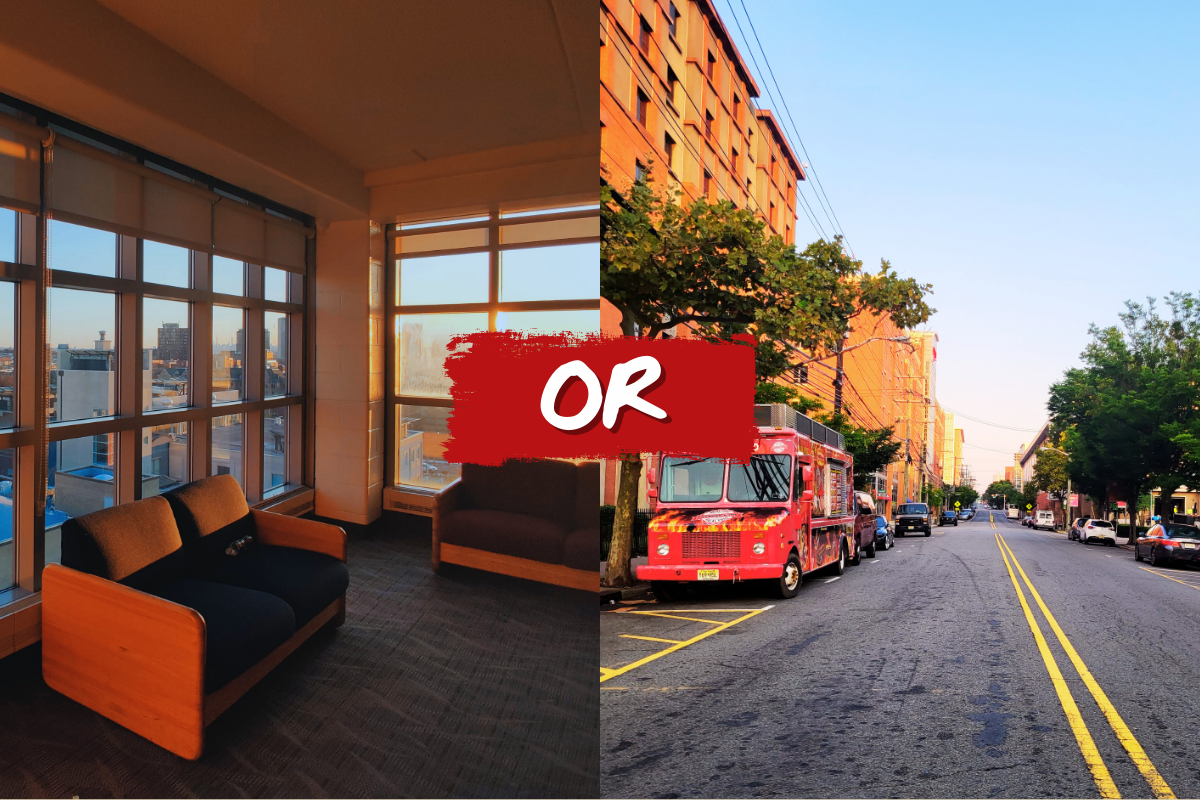As a new student at NJIT, one of the things that attracted me to the university was the diverse people and opportunities both on and off campus. Located in the heart of a city, NJIT doesn’t come off as polished as other campuses I had previously visited ⏤ there is no competition with the beauty of wilderness. However, to that same end, being on campus in the city offers its advantages. A different kind of beauty lies in authentic food made with love, connections between cultural barriers, and new experiences.
Arriving on campus as an Albert Dorman Honors Scholar staying in Martinson Hall, I couldn’t have missed the number of food trucks stationed outside. My first thought was, “I must have chosen the right place because the diversity of culture I was looking for is right outside my door,” and of course, on the same night, I gave the food a try.
For those who’ve already tried the Taj Mahal, Gigi, or Al NJIT halal food trucks, you likely already know that the food is quite good. Furthermore, the food trucks never fail to impress with their low prices, especially given the quantity and quality of food served. As students today struggle to cope with increasing tuition bills on top of the seemingly unending inflation of everyday products from food to clothes, NJIT’s campus food trucks provide a refreshing reminder that good food still exists at a fair price. For under $10, you can get a filling meal and drink. But how are they doing it? How do NJIT’s food trucks strike such a pleasant balance between quality and cost?
In an attempt to better understand and answer those questions, I set out to interview one of the food truck owners. What was their motivation? What is their cultural background? Has it been challenging for them to maintain prices at a competitive level?
Kirellos Nageeb, the owner of Food Lamb LLC, knows the meaning of hard work and has a serious passion for food. He has been in the food truck business for 10 years, the last two years being at NJIT. Nageeb has lived in the United States since emigrating from Egypt in 2006. Before opening his food truck, he worked as an Uber driver.
When I asked him, “What inspired you to start your own business?” He responded, “I like my job, I like what I do.” I clarified, “You like making food?” He responded with a smile and a firm head nod. His positive attitude is reflected in his food; every item feels like a home-cooked meal, made with love and care. His response said a lot with just a few words ⏤ most of us wish we could confidently say we enjoy what we do daily. Conversely, many of us seek a career even with the expectation that much of the work will not be enjoyable.
Nageeb was affiliated with the NJIT campus through a friend and received money from NJIT to support his business. Though I somewhat suspected this, I was pleasantly surprised. Given how much his truck and the others contribute to our campus, it’s a no-brainer.
Though some may wonder how Food Lamb LLC gets by during holiday breaks, Nageeb affirmed that the business does fine during those times of the year. Even when class is out of session, there are regular customers daily.
In many parts of the world, especially in the United States, food service workers are often looked down upon as having a lower-status job. In many instances, food service workers have quite a poor experience, which is not often characterized by a love for the product produced. As someone who has previously worked in food service, the experience may be worse than people imagine. However, in this case, I witnessed quite a different kind of food service. I saw someone working at their own pace, preparing food they were passionate about, and serving it with grace. Hospitality toward guests never seemed forced because they display genuine excitement when someone shows interest in their business and tries their food. For anyone who hasn’t already, I would recommend giving one or all of the food trucks a try. Before long, you might become a regular.

































Rich • Nov 22, 2024 at 12:35 pm
Happy to hear the food truck scene is still strong on campuses. A couple friends of mine have started a Caribbean food truck business and profess a similar satisfaction and pride in their service.